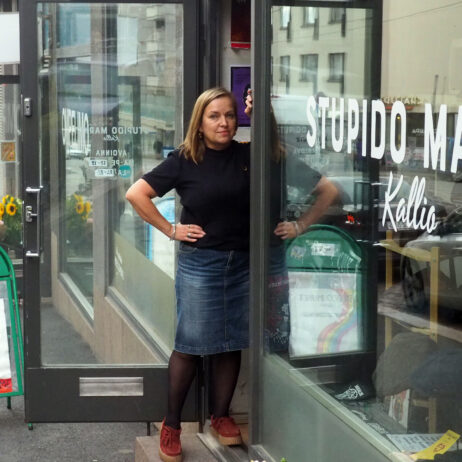Anni Pohto: From Tampere to Abbey Road

Anni Pohto’s musical path began in Tampere, where her early interest in the piano sparked her passion for music. “I started composing my own songs right away,” she says.
Later, she realized that creativity was a way for her to channel her inner world.
“I’ve always written a lot, not just music but also essays, short stories, plays, and poems.”
Eventually, music became a career as songwriting and composing began to take up more of her time. Pohto’s path led her through a couple of albums, over ten singles, and other projects, all the way to London, where she is now working on breaking through internationally.
Currently, Pohto has released several singles from her upcoming album, “The Rising,” set to drop in the fall. Alongside her music career, Anni Pohto holds a Master’s degree in Political Science, specializing in peace and conflict studies.
“As an artist, I feel connected to the same creative current as the 19th-century Finnish esotericists. That’s why I chose the name Pohto as my stage name — to gain spiritual peace and the freedom to create outside of my academic identity.”

Small, meaningful moments
Though Pohto’s career has taken her as far as London, her music journey hasn’t been all about chasing high points. According to Pohto, the most meaningful moments often come from small things, like feeling a deep connection when playing with someone else.
“Often the most significant moments come from something seemingly small — like that magical feeling of connection when playing music with someone,” she says.
The biggest professional highlight so far was the chance to record and film at Abbey Road Studios in London.
“Looking back, that day feels like a dream,” Pohto reflects.
Preparing for the studio session was a meticulous process. She made sure the entire team spent a week together in London, rehearsing and fully immersing themselves in the music.
“The collective excitement and vibe lifted the studio session to another level,” she describes. The results of this session will also be released later this year.
Finding her voice
While highlights like Abbey Road are unforgettable, the daily reality of a music career can often feel lonely and uncertain. Seeking and offering support is crucial. Pohto has also tried to help other artists find their voice and sharpen their artistic vision.
“I’ve also been teaching and coaching other creators because much of the knowledge I needed to learn was only available abroad or in books,” Pohto says.
She believes that an artist’s main task isn’t technical mastery but the ability to stay true to their own voice and vision.
“Learning to be still and listen to your own voice — in the broadest sense of the word — is the most important task for an artist,” Pohto notes.
Copyright Income as Part of the Whole
According to Pohto, copyrights are significant both financially and symbolically.
She currently receives Gramex royalties from her own music as well as from the “Medium” album, which she made with Pyhimys. The “Medium” album remains one of her most well-known projects and continues to generate Gramex income.
“At the moment, Gramex royalties are a small but important part of a larger whole,” she says.
However, the importance of Gramex income has declined with the rise of streaming and social media.
Pohto predicts that without major radio hits, her Gramex income will likely continue to decrease: “I assume that without a big radio hit, my Gramex income will unfortunately keep shrinking.”
She notes that this is particularly challenging for an artist making English-language music in Finland, where Finnish-language songs dominate radio playlists.
The right to self-expression
Copyrights also carry a deeper meaning for Pohto. Her brother Tuomas Mattila explored the subject in his doctoral dissertation, “Yhteistyö tekijänoikeudessa.”
One line in the introduction struck a chord with Pohto: “In copyright, creative work is not solely about producing a distinct form but also about conveying meaning in the service of self-expression.”
“I still get emotional reading that introduction — especially when I think about the centuries-long history of silencing women and how it continues today, for example, in Afghanistan.”
Pohto sees her creative work as part of a generational struggle to assert her voice. For her, copyright serves as a reminder that she has the right to exist, to express herself, and to claim space in a world where women’s voices have been suppressed for centuries.
“For me, creating is part of a much larger, intergenerational struggle where I finally have the freedom and opportunity to express myself. Even though copyright’s financial significance will eventually expire, its symbolic power to declare ‘I made this’ remains,” she says.
Creativity is needed now
Pohto’s background in peace and conflict studies is also evident in her artistic perspective. She emphasizes that creativity, art, and self-expression are essential to humanity’s progress.
“Our ability to imagine, tell stories, and create art is the one thing that ultimately distinguishes us from other animals,” she says.
“Without creative expression, we’d just regress into being another biological entity among many — a superbug with nuclear weapons and AI.”
“That’s why being creative and supporting others’ creativity is a revolutionary act. We need creativity, art, freedom of expression, and self-expression now more than ever.”
Anni Pohto’s latest single “Yard Sale” was released on the 4th of April.




